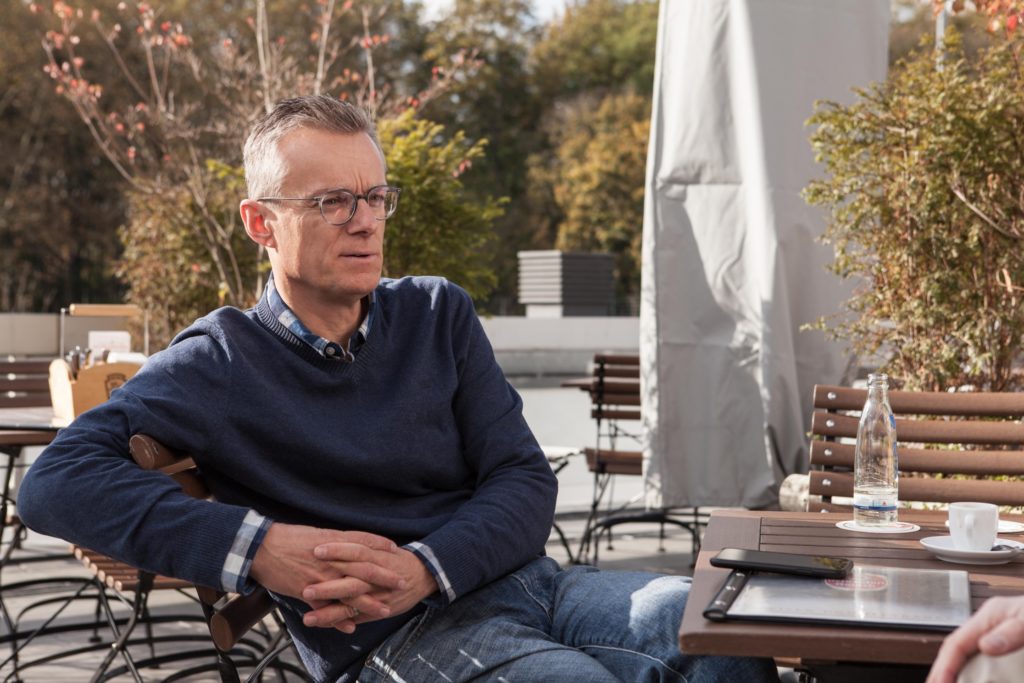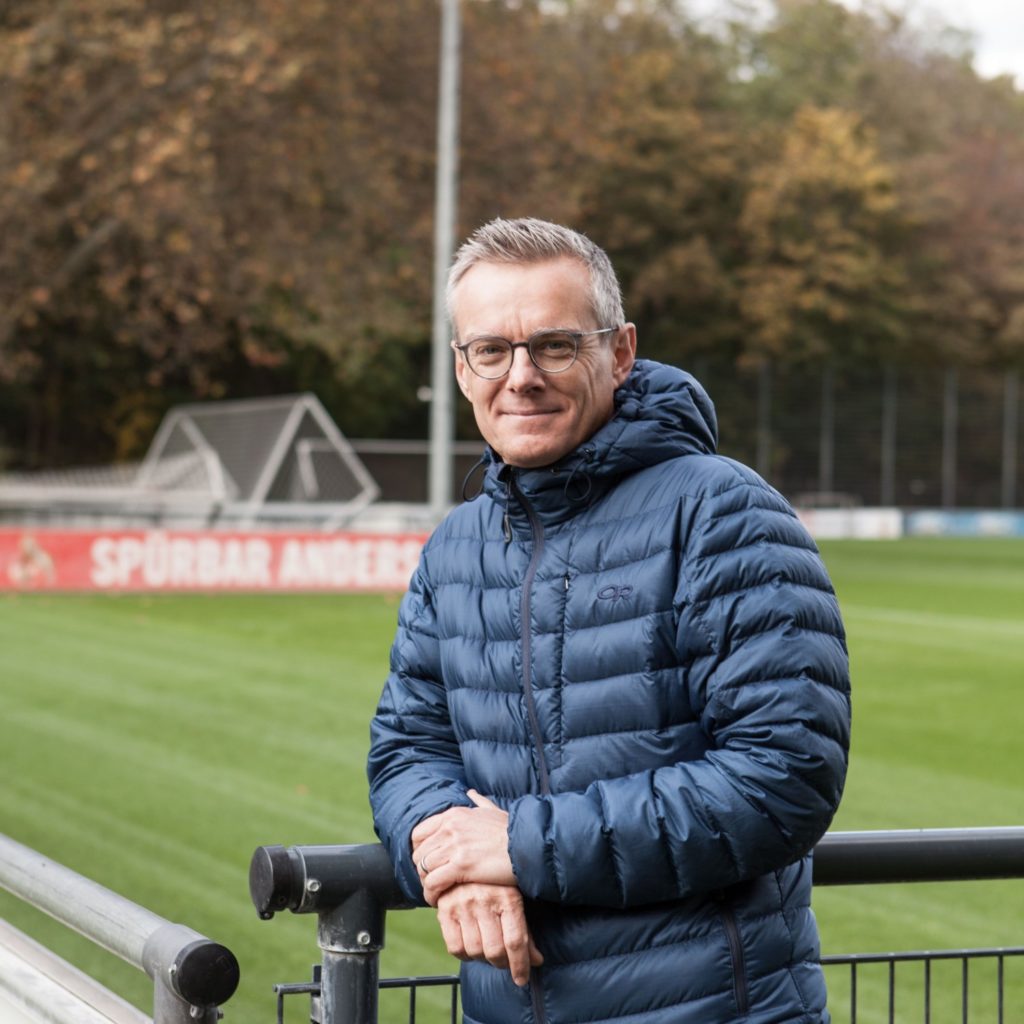Interview With Marcus Schüller, Management Consultant.
I met Marcus Schüller in mid-October 2019 at the famed Geißbockheim, training grounds of our mutual favorite association football club – 1. FC Köln. A lot has changed since then. In the world, in our hometown of Cologne and in business.
The Geißbockheim is our meeting place for a discussion about an industry that is undergoing perhaps the most profound change in its history. As part of our series of interviews with Business & Management Consultants, I speak with Marcus Schüller, a procurement expert, and partner at a reputable strategy consulting firm. We exchange thoughts about beginnings in classic Mom & Pop companies, analog and digital consulting services, new technologies, and of course the 1. FC Köln. The most frequently asked question in the industry is: How have customer demand and the offer of management consultancies changed? Please remember, this exchange took place well before the Corona Crisis.
One thing becomes clear very quickly: in Schüller’s opinion, the principles of the industry have not changed drastically, but have shifted. “No matter whether you do analog consulting or digital consulting, you need customers and name recognition. Furthermore, you have to deliver quality. What is different today – but I see this more as an opportunity than a problem – is that the range of possibilities is much wider. In the past, consultants sold themselves.

Nowadays you often sell technology – depending on your business model. ” Of course, consulting without technology is currently hard to imagine, unless you are a ‘personal advisor’ of the top management. Just a few years ago, the term ‘technology’ almost exclusively stood for project analysis with Excel or PowerPoint. In late 2019, of course, there are entirely different tools available for data processing and analysis in consulting projects. These tools not only make analysis faster, but they also ensure
corresponding gains in efficiency and noticeably increase the quality of results. According to Schüller, however, they do not act as a differentiating factor: “Differentiation probably takes place elsewhere, most likely at the back of the value chain, that is, during design or execution. This is one of the reasons why all the leading strategy consulting firms continue to invest heavily in the area of operations.”
In addition, the consulting expert considers the internationalization of the entire industry – favored by digitalization and improved communication – to be an important influencing factor. This is because the virtual form of working has a massive influence on the consulting industry. In many large projects, only small teams are directly on site. The majority of the staff work virtually. It is important to note that cost factors are not always the only factors that play a role. The main concern of virtualization is to have the right skills always at hand. Clearly, the ongoing digitalization favors the internationalization of management consulting to an enormous degree. The regional presence will continue to play an important role in auditing or tax consulting.
War for Talents in management consultancies: What happened and what is happening.
Internationalization is changing the way consultants work. Does this also include the classic consultant week, i.e. four days at the client’s premises and one day in the office? Marcus Schüller confirms this for classic management consulting. And how does this perception affect young people, in other words, the next generation of consultants?

Schüller has a clear opinion on that: “The expectations have changed quite a bit. Nowadays, fewer people are interested in classic management consulting, where working on weekends is more of a standard. The challenge for consulting companies is to offer an environment that meets the expectations of young people. On top of that, there are high demands of the clients. This makes it more difficult to create a suitable work-life balance for applicants”. However, his experience also shows that the right mix of
high-level specialization, demanding, often international customers, and the opportunity for rapid individual development still has its appeal. Additional factors such as family aspects play an important role in the meantime, at least for the larger companies.
Customer access is changing. What role do digital networks play as a distribution channel now and in the future?
Due to changes in customer access, behavior patterns have also changed. What effects does this have on the sales channels of consulting services and what role do networks play in this context? The passionate FC fan and consultant Schüller says: “Things have certainly changed. If I now stick to the different forms of consulting, that is classic management consulting versus technology and management consulting versus pure technology providers, I can already see how diverse sales are. Management consulting is still characterized by strong networks, marketing, and tendering. In the case of technology consultants, it is partly structure-driven sales that still take place, as it used to be the case with software vendors. Then, new sales channels will probably be added, like your platform APADUA. They establish themselves as new models. Another topic is, for example, social media. I can actually say that I have sold some projects directly through social media.” A simple posting is nothing more than marketing, as Schüller explains: “Well, it’s not that someone writes to me every day and says: I have a project and would like you to carry it out. Unfortunately, the world is not that place. So you do marketing for the company or the topic you stand for and then you are linked to the topic. That’s how the contact is made.”
The current role of procurement in sourcing consulting services.
“In any case, procurement is playing a greater and more professional role than ten years ago. Sometimes maybe even too professional. Part of the professionalization is objectification, which is so far-reaching in traditional management consulting that social and emotional factors such as personality and trust are often neglected. The best degree of professionalization in sourcing consulting services is probably achieved through establishing a mixture of objective factors, in which the soft skills, which are highly relevant in consulting, are not neglected”. But is it not the commercial aspect that comes up short with this version of Schüller, I ask? Here it depends on the individual consulting service, explains Schüller: “If it is a highly standardized service, I see the costs as a very relevant factor. The more comparable the service is and the less the topics personality, trust, references, and emotional competence of the consultant play a role, the more I can consider the cost factor.”
About the way, we deal with competences and references. And the building of trust.
In a nutshell: references are needed, as they are highly relevant and necessary to project competence. Schüller, however, adds to this core thesis: “I would like to add another dimension to the topic of competences. I am still missing a term, namely trust. Consulting basically feeds off two aspects: competence and trust. I presuppose competences or I can check them by means of references. So you can see fairly quickly whether someone has an idea of what they are selling. The question of whether I can trust him is much more difficult to find out. The issue of trust is also very important in the consulting industry because clients often don’t know whether their goals will be achieved by the end of the project. “Often this trust – or rather a lack of trust due to uncertainties – is substituted to a certain extent by reputation,” I add. Schüller confirms my thesis using a short example: “There is trust in a brand, for example. A well-known brand potentially makes it easier to gain the trust of customers. With a classic management consultancy, it is still the case that I have a person in front of me. I can only gain trust over the duration of the project. Otherwise, you can verify whether the consultant is trustworthy by looking at his references or by talking to people who have had experience with this consultant.”
Where the consulting journey leads.
“I think there will always be room for classic, individualized management consulting. This has a lot to do with high competence, trust, and the personality of the consultant. On the other hand, there are services that can be standardized, in other words, the industrialization of consulting. Because everywhere I industrialize, I no longer buy a person as a consultant. The question is, of course, how far-reaching this development is, how far you can really push the industrialization or digitalization of consulting. In addition, I think that the training and qualification sector still has great potential for growth. In completely different forms, i.e. much more digital and virtual. It is also exciting to see how consulting services will adapt to new life models and the work-life balance in the future. What Schüller means exactly with his last sentence is explained in the following: “In the future, for example, classical consulting teams will be facing a team of freelancers. This will result in new challenges with different advantages and disadvantages. The disadvantage is that a lot of effort is required to maintain a certain quality standard when working with freelancer teams. In addition, control and management are then more complex. A big advantage is that you work with specialists that you can deploy at the right time and in the right place.”
To be in the right place at the right time – that is exactly what the two consulting experts and passionate FC fans hope for the team from the Geißbockheim at the end of this interview. According to the current standings (October 2019), they could do with some consulting services.
About Marcus Schüller

Marcus studied business at the University of Cologne, followed by a doctorate. In 1998 he joined BrainNet, a boutique supply chain and procurement consulting firm in Bonn. He had a classic career path there, starting as Consultant, then Manager finally Partner. From 2012 to the end of 2019 he was Partner at KPMG Advisory. Currently, Marcus is a Senior Partner of a strategy consultancy with a focus on operations. He’s always been a fan of 1. FC Köln.


